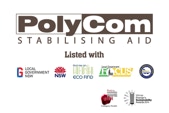PolyCom Stabilising Aid - highly effective yet simple road stabiliser.



Procuring PolyCom for Sustainable Roads
Re-sheeting was once the norm when maintaining unsealed roads.

As gravel pits close for environmental and other concerns, the challenge of sourcing good materials continues to rise and the purchase price becomes more and more inhibitive.
Furthermore, heavy trucking routes are extended, increasing the cost of transport to site.
There are several additional factors to consider when evaluating the real cost of re-sheeting.
1. Repeated heavy truck loading to the section being re-sheeted leads to deterioration of the council roads on the way to the road being maintained. ‘Chasing your own tail’ in this manner is not financially sustainable.
2. One of the many reasons new material is imported is to overlay clayey materials, which soften when wet, making for dangerous driving conditions. These sections then require ongoing maintenance to meet service intervention levels.
In the face of these challenges, many councils have adopted a new practise to rejuvenate their existing road materials without bringing in new material - at around half the cost of re-sheeting.
Their solution decreases the need for maintenance grading by an average of four to six times.
The outcome is an unsealed road that requires less maintenance, performs better in wet weather and produces less dust in the dry by utilising existing clayey or higher Plasticity Index materials.
The road maintains shape, and saves the damage caused by heavy truck movements to council roads both sealed and unsealed.
For financially sustainable unsealed roads, the solution is PolyCom Stabilising Aid, an environment and OHS compliant product, winner of the 2014 Banksia Awards and 2014 Premier’s Sustainability Awards.

17 Mar 2015